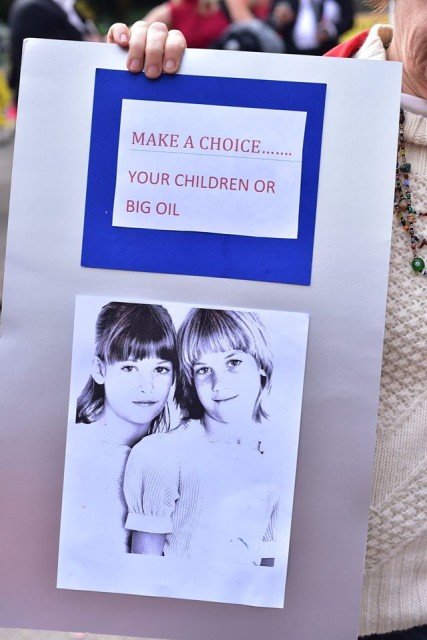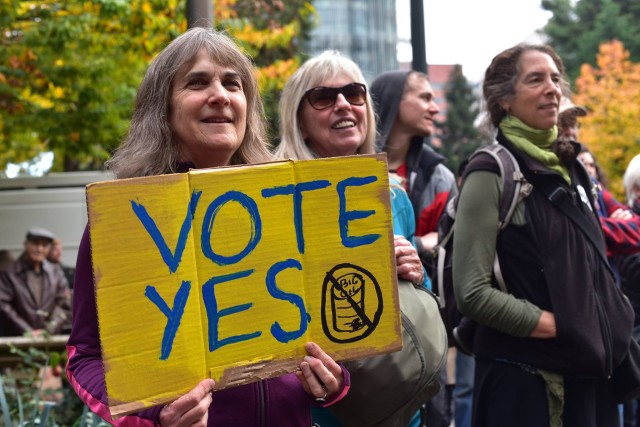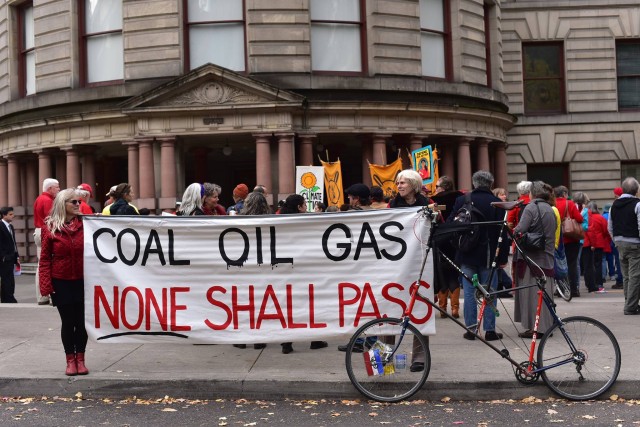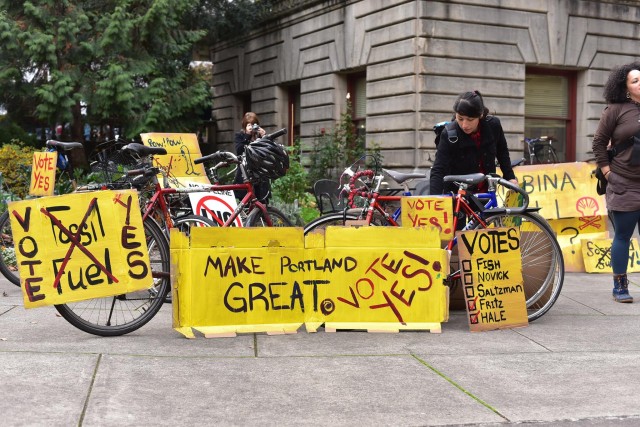Story and photos by Pete Shaw
A resolution opposing projects in Portland, Vancouver, and the Columbia River Gorge that would increase the number of oil trains passing through the region was approved by Portland City Council on November 4 by a vote of 4-0. A second resolution which would declare the City’s opposition to the expansion of infrastructure that would primarily be used to transport or store fossil fuels “in or through Portland or adjacent waterways” will be decided on November 12.
The oil train resolution was proposed by council member Amanda Fritz while the infrastructure resolution was proposed by Mayor Charlie Hales.
It was not quite the victory activists were seeking–prior to the council session over 300 people gathered outside City Hall, hoping both resolutions would be approved–but there was still great optimism that Hales’ pending resolution will also pass.
The mere fact that the resolutions were proposed in the first place is a prime example of the power of organizing and solidarity. Mayor Hales stated both in the council session as well as at a press conference earlier in the day that he felt compelled to act because of his meeting with Pope Francis in July in which the pope discussed the urgency of tackling climate change.
No doubt that meeting played some role in his decision, but so, clearly, did the pressure applied by activists who over the course of the past few months have scored some major victories, and, even in seeming defeat, have helped advance the understanding that steps must be taken immediately to mitigate the effects of climate change.
 It was a different Hales from the one of a year ago who, in conjunction with the Port of Portland, announced a deal with the Pembina Pipeline Corporation that would bring a propane export terminal at the port–a move that angered many in the region and prompted ongoing opposition to the project. In April, Pembina opponents demanded that the Portland Planning and Sustainability Commission reject the necessary rezoning of port land that would allow the terminal to go forward. While the commission approved the rezoning by a vote of 6-4, the project would still need to find support in the City Council which was due to take it up in June.
It was a different Hales from the one of a year ago who, in conjunction with the Port of Portland, announced a deal with the Pembina Pipeline Corporation that would bring a propane export terminal at the port–a move that angered many in the region and prompted ongoing opposition to the project. In April, Pembina opponents demanded that the Portland Planning and Sustainability Commission reject the necessary rezoning of port land that would allow the terminal to go forward. While the commission approved the rezoning by a vote of 6-4, the project would still need to find support in the City Council which was due to take it up in June.
But in May–two months prior to meeting Pope Francis–Hales unexpectedly withdrew his support for the Pembina deal and the project was shelved. The move was widely understood to be the result of pressure exerted by the large numbers demanding Portland live up to its professed environmental standards by taking steps to curb the use of fossil fuels. Hales, who at the time was planning on a reelection bid, noted the thousands of calls from Portland citizens who opposed the terminal.
Then, in a breathtaking 48 hours in late July, kayaktivists took to the Willamette river in North Portland while Greenpeace activists rapelled from the St. John’s Bridge in an effort to keep the Shell ice breaking boat Fennica from traveling to the Arctic to assist in the controversial exploration for oil in that ecologically fragile region. Though the blockade was ultimately broken, the action made international news and further galvanized opposition to the reckless expansion of fossil fuel dependence.
Though fresh off his visit with the pope, Hales stood in support of breaking the barricade, or rather–as the hundreds gathered in Cathedral Park put it–Shell’s right to destroy the planet. While many thought he might have used his newly found environmental conscience to side with the protestors, ultimately he chose to come down on the side of the establishment.
A few months later, in the wake of Ted Wheeler’s mayoral bid and lower polling numbers, Hales dropped out of the race, saying he wanted to concentrate on finishing up his term rather than spending time campaigning and fundraising. This step finally reaches for a match between action and the rhetoric Hales so often uses.
Which brings us to Wednesday’s council session, in which not all commissioners appeared to be as ardent in their climate change stance as Hales purports to be. Commissioner Steve Novick, seen by many as the necessary third vote to pass the resolutions, voiced clear unhappiness–enumerating in his introductory remarks the various hypocrisies of using fossil fuels while passing rules against them. In some respects Novick sounded more like the conservatives who condemned the anti-Shell kayaktivists for using boats made out of petroleum products, than the champion of progressive values he so often declares himself to be. Novick took the same tack he has taken on other issues–such as coal trains going through the region–saying a federal solution was needed, which seemed to infer that a City resolution would somehow make a federal solution impossible.
Novick came across as someone wanting it both ways. On the one hand he talked about climate change being the issue of our times. On the other, taking steps necessary to prevent the catastrophic results of climate change was a job for someone else. In the end, however, facing a standing room only crowd (plus a few overflow rooms watching a live feed of the session) almost entirely composed of those looking to the future–one that would leave upcoming generations with a livable world–Novick folded. At 6:15 PM he wearily and resignedly voted aye to Fritz’s resolution. As it turned out, his vote was not needed as Commissioner Nick Fish also supported it.
 Hales agreed to push back the vote on the second resolution in the hope of getting everybody on board, while indicating–probably in reference to two proposed amendments Novick attempted to make to Fritz’s proposals–that “we will not water down or dilute the intent of these resolutions.”
Hales agreed to push back the vote on the second resolution in the hope of getting everybody on board, while indicating–probably in reference to two proposed amendments Novick attempted to make to Fritz’s proposals–that “we will not water down or dilute the intent of these resolutions.”
It will be difficult for any council member to enter their next race having shot down this resolution Would Novick really have wanted to face reelection known as the person who talks about how important it is to address climate change, but when given the chance to do so, said no thanks? Prior to the council session, outside of City Hall, a few people were toying with nicknames for Novick should he vote against the resolutions. He would certainly face a more difficult path to retain his council seat were he to be branded with a moniker like “Fossil Fuel Novick”.
Prior to casting his vote on Fritz’s resolution, Hales talked about a couple of moments that opened his eyes. Not long ago, he and his wife were sailing on the Willamette and had to wait for the Burlington-Northern Bridge to turn. After they passed through, they saw that the bridge did not close all the way, and that a man was using a “big sledge hammer” to try to align the rails. This did not inspire great confidence in Hales.
The other moment came when conferring with Fire Chief Erin Janssens about Portland’s readiness to respond to an oil train explosion. Janssens said the city was not ready. Both issues, Hales said, got him thinking about safety issues, particularly the city government’s responsibility to the safety of Portland’s citizens, an idea he seamlessly wove into Portland’s responsibility to lead on climate change both nationally and internationally.
He then talked about “this big, vague general provision” in the City Charter that describes the mayor’s job as exercising “a careful supervision over the general affairs of the city.” Hales translated those words for the gallery: “Pay attention. Vote your conscience.” With that, he voted aye, brought down the gavel, and adjourned the meeting to a loud, sustained cheer from those in attendance.
It was a remarkable moment.
 That Hales brought forth his resolution surprised many people, though perhaps they should not have been. Maybe what people are seeing now, at least on this issue, is the real Charlie Hales–not the candidate who is worried about whom he must satisfy to get votes or campaign cash. Though we may not ever see this man rappelling from the St. John’s Bridge with flags of red and yellow, our mayor appears deeply concerned about the disastrous impact climate change will have on future generations. And while it may have been an all too rare moment where the depth of Hales’ moralistic rhetoric approached his action, it was a welcome shift nonetheless.
That Hales brought forth his resolution surprised many people, though perhaps they should not have been. Maybe what people are seeing now, at least on this issue, is the real Charlie Hales–not the candidate who is worried about whom he must satisfy to get votes or campaign cash. Though we may not ever see this man rappelling from the St. John’s Bridge with flags of red and yellow, our mayor appears deeply concerned about the disastrous impact climate change will have on future generations. And while it may have been an all too rare moment where the depth of Hales’ moralistic rhetoric approached his action, it was a welcome shift nonetheless.
More importantly, while that shift was brought on by a myriad of factors, acknowledged or not, it is clear that the steadfast work of many people has helped advance the the argument that the health of future generations should take precedence over fossil fuel profits.
Their persistence is paying off.
The fight is not over. Call the members of the City Council and demand they support Mayor Charlie Hales’ proposal opposing expanding fossil fuel infrastructure. Then show up at the City Council hearing on Thursday November 12 at 2 PM and let your voice be heard. The phone number for the City Council members are:
Charlie Hales: (503) 823-4120
Nick Fish: (503) 823-3589
Amanda Fritz: (503) 823-3008
Steve Novick: (503) 823-4682
Dan Saltzman: (503) 823-4151







